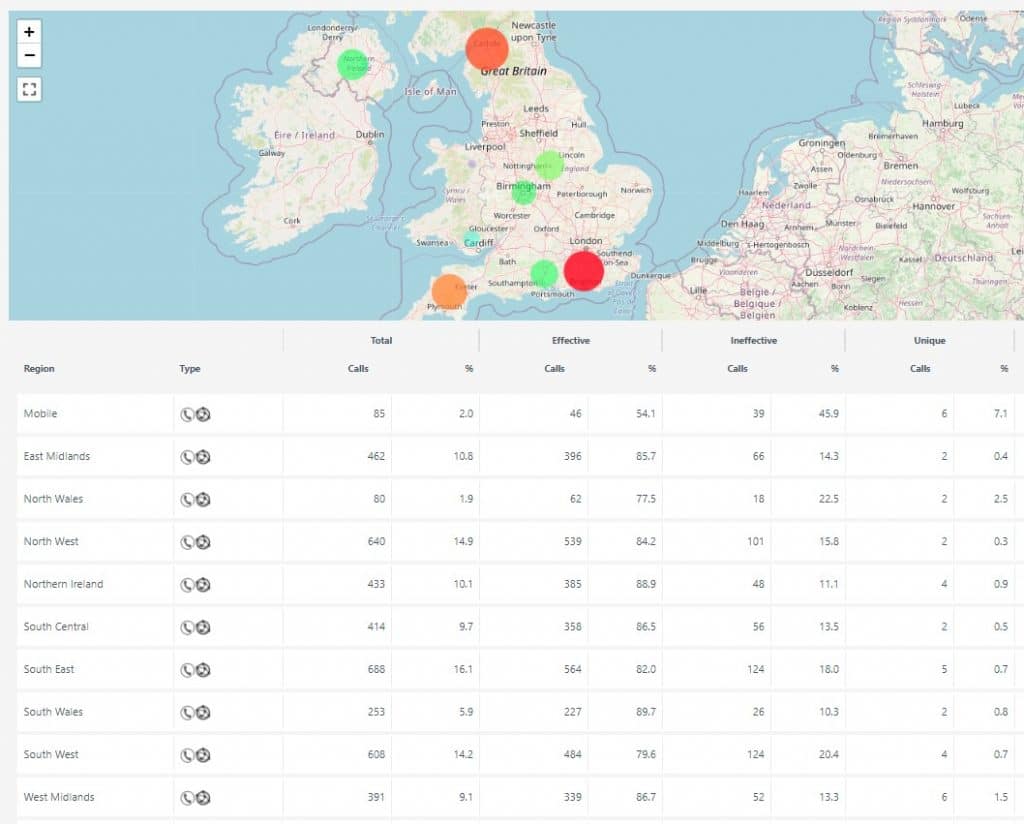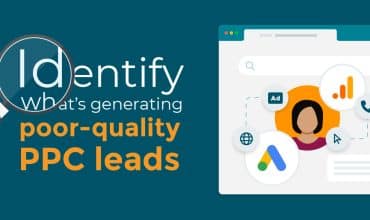7 quick-win benefits of call tracking
Call tracking has some big, headline benefits for businesses – such as helping to drive up campaign ROI and slashing marketing budget wastage.
We talk about those big benefits of call tracking a lot on this blog and throughout our website – because we’re proud of what Mediahawk can help marketers achieve!
And our clients love the results they get from Mediahawk, as they often tell us in our call tracking case studies.
But call tracking is about way more than the big-picture benefits.
There are lots of quick wins you can achieve, too. Often from day one of using the software.
Everyday call tracking quick wins
Diving into the ‘lesser-known’ benefits of call tracking reveals some incredibly useful insights that can really bolster your marketing efforts.
Here are seven benefits of call tracking that you won’t want to miss:
1. See the location of your strongest leads
Localised marketing activity – such as local SEO, or geographically targeted paid advertising – relies on solid insight into where your best leads are based. If you’re throwing budget at campaigns targeting customers in London, but your hottest leads tend to be up north, you’ll be throwing away a lot of money.
In Mediahawk, the geographic reports show you the cities, towns, regions and countries your most conversion-worthy leads come from. It means you can make super-accurate decisions about where you apply future campaign budget and be sure your efforts are only reaching the people that matter.
2. Pinpoint the strongest leads by call duration
Did you know that longer calls are more likely to result in a higher conversion rate? It makes sense, as callers who hang around longer on the phone are likely to be more engaged and ‘ready’ for the next step.
Mediahawk has a call duration report, which you can sort and filter to show the calls with the longest durations. Using this insight, you can adjust future campaigns based on the details of these callers – perhaps to target them with specific pieces of content related to the queries they raised during their call.
3. Have your team ready at the right time of day
If there are certain times of day when call volumes increase, you’ll want to have a good view of that trend. Having sight of this means you can optimise your team for busy periods and ensure you never miss a sale. Your team are ready and waiting when the calls come in. Equally, why get your team focused on taking calls at quiet times, when they could be more productive on other tasks?
The call time of day report in Mediahawk gives you a complete view of call volume trends over time. It means you can see the peaks and troughs of incoming calls and use the insight to staff your team appropriately.
4. Make device-based optimisations and improvements
With insights into the devices used by web visitors and their user journeys, you can make much more targeted marketing decisions, such as:
- Ensuring your website supports the most commonly used devices – based on your web visitors’ preferred devices and common user journeys
- Finding opportunities to develop content and calls to action for specific devices
- Improving the user experience on your website and across the customer journey
- Being sure that your marketing campaigns are bringing in traffic from the intended devices
Mediahawk allows you to track the device types used by web visitors and callers, in much the same way Google Analytics does. The difference with Mediahawk is that you can link up device type insights with other elements of the online and offline customer journey. For example, do iPhone users tend to see certain ads on Facebook? Or do your Android-favouring customers often call you after viewing certain web pages?
It all helps build an ever-richer picture of your target audience’s behaviour.
5. See which web pages bring the most calls and leads
Most websites have certain pages that stand out as more highly trafficked than others. But that doesn’t mean those are your best-performing pages in terms of conversions. If you have a lot of leads coming in by phone, you may find that a significant portion of them view certain web pages first.
Knowing this could influence the decisions you make about content strategy and ad spend..
In Mediahawk, you can drill right down into which pages callers commonly visit. You can see this as part of the whole customer journey, too. For example, you’ll see how your lead originally arrived at your website, what pages and content they looked at, and what page they ultimately called you from.
6. Focus effort and budget on the leads that matter most
Not all calls are equal. Some leads are hotter than the sun, others need longer to warm up. As a marketer, you need to prioritise leads based on how likely they are to convert.
So, wouldn’t it be great if you could score your calls based on how hot the lead is, then put them into a priority-based list to follow up on?
In Mediahawk, you can do exactly that. You can define your own criteria for scoring the leads and tell Mediahawk how you’d like them to be prioritised. For example, you can tell Mediahawk to class leads who mention the phrase ‘would like to buy’ as a hot lead and tag them accordingly.
Another useful feature is using Mediahawk to find which ads cost you a lot of money but don’t return very many conversions. For instance, if your pay per click (PPC) media spend is going through the roof but conversions are through the floor, you can look at the departments your PPC calls are going to – by having Mediahawk tag each call with the department concerned – and identify any problems. You might find recruiters or prospective suppliers touting for business are draining your budget inadvertently.
7. View the data you want to see, however you want to see it
A call tracking tool is only useful to you if you can extract the insights you need for your specific requirements. There’s nothing worse than drawing insights from a marketing analytics tool that aren’t actionable or don’t mean anything to your business.
That’s why we’ve made Mediahawk as customisable and user-friendly as possible. With our secondary dimensions (which are included with Mediahawk as standard), you can slice and dice your reporting data in multiple ways to get to the insights you need.
For example, want to know what days of the week your paid search ads tend to generate the most phone calls? That’s no problem with secondary dimensions in Mediahawk.
There’s a lot of data you can add as a secondary dimension, and you can also apply different CTAs as a dimension too. Setting them up is as easy as it is in Google Analytics too, and should feel very familiar to any marketer.
While the big, bold benefits of call tracking software are worthy of grabbing headlines, the daily quick wins make a huge difference to marketers’ lives, too.
When you factor these quick wins into your campaign planning and customer insights, the benefit to your business will be felt far and wide.

Book a no-obligation, 15-minute demo of Mediahawk and we’ll show you how your business can benefit from these quick wins and much more.








